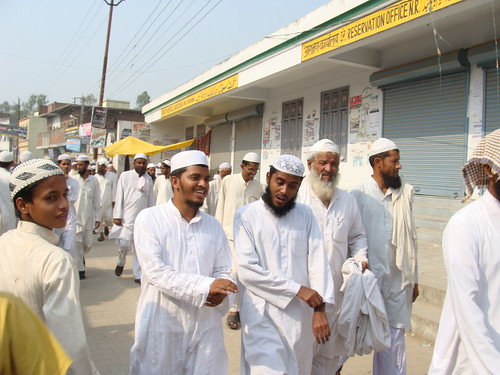By Asghar Ali Engineer,
It is believed by millions of Muslims across the world that Shari’ah laws are immutable and represent divine will. It is based on serious misunderstanding. Shari’ah is not and cannot be immutable. Recently I was invited to what is called Jaipur Literary Festival held in Jaipur (Rajasthan) from 24-29 January to be part of a panel discussion on the book Heaven on Earth….. by Sadik Kadri of London which is on application of Shari’ah laws across the Muslim world. He has travelled to different Muslim countries and talked to various Ulama and Muftis about Shari’ah laws as applied to their respective countries.
All of them were defenders of conservative Shari’ah formulations and refused to admit any change. They maintained that Shari’ah being divine, cannot be changed. It is from this rigidity of our Ulama that this misunderstanding among common Muslims emanates that Shari’ah is divine and hence immutable. In fact our Ulama forget that ijtihad is not only permitted but encouraged by the Prophet of Islam (PBUH) and the hadith pertaining to Ma’adh Ibn Jabal is well known that when Prophet (PBUH) appointed him to the governorship of Yemen and when he came to take leave of the Prophet, he asked him, how will you govern Ma’adh said according to the Qur’an. The Prophet (PBUH) thereupon said if you do not find the solution to the problem in Qur’an, Ma’adh bin Jabal said according to Sunnah. But if you do not find it in sunnah also? He said ana ajtahidu(i.e. I will exert myself to find the solution. The Prophet thereupon patted his back and said you are right.

Cultural context plays very important role in formulation of Shari’ah laws
All Ulama accept this hadith and yet while theoretically admit permissibility of ijtihad, refuse to do it or allow it saying there is no one capable of doing it. In fact what is unalterable is principles and values underlying Shari’ah laws i.e. usul al-fiqh cannot be changed but laws based on these usul and values must be changed with the change in the social and cultural context. In fact cultural context plays very important role in formulation of Shari’ah laws. The Arab aadaat (customs and traditions) form an important part of Shari’ah formulations.
Late Abdur Rahman Wahid, President of Nahdat al-Ulama in Indonesia who also became President of that country told me once that there was great debate among the Ulama of Indonesia whether the Indonesian customs and traditions can become part of Shari’ah laws as applicable in Indonesia and those who advocated Indonesian aadat ultimately won.
Let us remember that what was called Muslim ummah (community) during the Prophet’s time was limited to Arabia only but when Islam spread to different areas ummah was no more confined to Arabs alone but to Iranians, Uzbeks, Turks, Chinese, Indians, Indonesians, etc. Thus there were various linguistic and cultural groups with so many different linguistic and cultural communities. The Shari’ah laws were influenced by these factors. Thus ummah was no longer homogenous group but comprised of various religious and cultural communities with their own age-old customs and traditions.
However the values, maqasid (intentions) and masalih (welfareness) of human beings did not change. Maqasid al-Shari’ah and Masalih al-Shari’ah do not change but in order to maintain these values, maqasid and masalih intact the rules framed by Ulama must change. When Imam Shafi’I moved from Hijaz to Egypt which was confluence of Arab and Coptic culture, he realized this and changed his position on several issues.
However, what I am saying does not apply to ‘ibadat i.e. matters pertaining to worship, world hereafter etc. but only to matters pertaining to mu’amalat i.e. inter-personal relations like marriage, divorce , inheritance and many other similar socio-economic matters. Most important of course among these are matters pertaining to marriage, divorce etc. In Jaipur I spoke mainly on women’s position in Shari’ah and women’s position in Qur’an.
The fact that pandal was packed with people shows the interest the women’s position in general, and that of Muslim women, in particular, generates. I said the book deals with only status quo and application of Shari’ah laws of patriarchal and feudalized Islamic societies. It very much misses what I call transcendental Qur’anic vision. Qur’an gives absolutely equal rights to man and woman without any discrimination.
However, Qur’an was revealed in a highly patriarchal society and also later got feudalized when khilafat turned into feudal empire. Thus patriarchy and feudalism completely distorted the fundamental Qur’anic vision of gender equality and women’s individuality and dignity. Unless we understand this sociological and cultural aspect and relate it to theological ones, we will miss the very revolutionary role which Islam wanted to play in totally transforming women’s status.
However, it is highly regrettable that Muslim societies could not produce ulama who could have had capacity to relate sociology with theology. Even in modern and post-modern societies our ulama totally lack transcendental vision of Islam. They have become prisoners of the past and have frozen Islam into feudal patriarchal society.
We need theologians with future vision to fulfill Qur’an’s mission of going beyond present which is full of injustices. Our society is full of gender injustices and Qur’an’s central value is justice, justice in all areas of life Gender justice is as emphatically emphasized as justice in social and economic matters. In order to emphasize gender justice it is high time that we produce female theologians with profound knowledge of Arabic language. Even the most conservative ulama cannot oppose the concept of female theologians.
—
Asghar Ali Engineer is the author of book Islam in Contemporary World. Sterling Publishers, 2007

